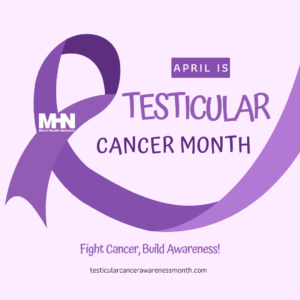A Disease of Youth and Health Negligence – Talking About Men’s Health

Testicular Cancer Awareness Month:
A Disease of Youth and Health Negligence
April is Testicular Cancer Awareness Month.
This month, along with other awareness periods that particularly emphasize the necessity of men’s well-being, is often overlooked by those operating in the health advocacy sphere. And if not comprehensively ignored, discussion surrounding testicular cancer is often relegated to a lesser priority, sidelined, or even treated as a light-hearted punchline opportunity.
But rates of testicular cancer are on the rise; in fact, they have been for some time:
According to the American Cancer Society, “The incidence rate of testicular cancer has been increasing in the US and many other countries for several decades…Experts have not been able to find reasons for this.”
And though the rate of increase appears to be slightly mitigating, testicular cancer is still the most common cancer in males aged 15 to 44, according to the National Institutes of Health (NIH).
The fact of the matter is that, as is the case with many cancers, testicular cancer is vastly more treatable if detected early on. Moreover, early stage testicular cancer can be detected via both self-examination and regular visits to a healthcare provider.
In fact, testicular cancer is uniquely easy to detect early on. In other words: prevention, as always, is fundamentally key to improving health outcomes. So, what is the excuse for its proliferation over the past few decades?
This question has a constellation of answers:
For one, many of the risk factors associated with testicular cancer are immutable in nature, such as European heritage, undescended testicles, family history or genetic predisposition, and other related testicular abnormalities (such as cryptorchidism), according to the American Cancer Society.
Furthermore, many cancers are linked to a lack of physical activity, consumption of alcohol and tobacco, and conditions such as obesity or being overweight.
This is not necessarily the case with testicular cancer, or at the very least there is not statistically sufficient evidence to confirm this claim. So, all of that being considered, testicular cancer is something of an anomaly.
Now, factor in the peculiarity of its age distribution, and testicular cancer is an absolute idiosyncrasy in the health world…
Some studies have linked testicular cancer to the presence of HIV / AIDS, citing that “increased risk for germ cell tumors (GCT), particularly testicular seminoma” is symptomatic of immunodeficiency (NIH). More research needs to be conducted, however, to verify any potential associations with testicular cancer and other, relatively less severe STDs, such as chlamydia, gonorrhea, syphilis, and even HPV (human papillomavirus). While many strides have been and are being made in the medical disciplines to further understand the intricacies and complexities of testicular cancer, public awareness and knowledge of the disease is still lagging behind that of breast cancer, for example.
Even prostate cancer has made significant progress both scientifically and in the advocacy space.
Testicular cancer remains mostly untouched.
Studies and research concerning testicular cancer are often eclipsed in terms of resources and funding by cancers that are considered to be more severe, less trivial. There is a common sentiment that we already basically have the answers and not much can be done. The risk factors are mostly immutable traits, the disease is mostly treatable, all the guidelines and processes have already been prescribed. Get checked and get checked early.
That’s “all that can be done,” apparently.
There is a proclivity in the public consciousness, as well as in academia, to predominantly focus on and prioritize health issues that disproportionately affect women. This tendency is more than understandable, as women have been systematically disregarded in the domain of medicine practically since its inception.
For example, “In 1977, the FDA issued a guideline banning most women of “childbearing potential” from participating in clinical research studies,” according to the Office of Women’s Health.
Obviously this has not been technical policy for decades now, but the residuum of these disparities persisted for some time, which led to a de facto misunderstanding of and discrimination in regards to women in the medical disciplines and health-oriented fields more broadly.
Many men, however, and especially young men, are unaware of this important historical context:
Young men merely experience a lack of outreach from healthcare professionals and public health advocates alike.
Young men experience social isolation and alienation as a result of norms surrounding masculinity; these feelings and conditions are compounded and augmented by a wide array of socioeconomic factors. Young men spend much of their time alone and online, exploring and being exposed to a whole world of health and wellness related content, an extremely small fraction of which is making any deliberate attempt at appealing to or addressing them. They experience this lack of outreach as being excluded or omitted from the conversation.
These young men feel as though they exist in a world that is at best indifferent to and at worst hostile to them, and public health advocates are not doing all that much to dispel this notion.
In the title of this article, I use the phrase ‘Health Negligence’ to describe a phenomenon:
Young men lack critical information regarding testicular cancer.

According to the study, Testicular Cancer Knowledge and Viewpoints of American Men,
A total of 250 men rated themselves as “somewhat unknowledgeable” about TC, with no respondents considering themselves “very knowledgeable.” Only 26.4% of men knew that TC was curable most of the time. Despite 90.8% of men feeling that their doctor had some role in discussing TC/TSE, only 17.2% had discussed these topics with their doctor. Even after being informed of the rationale behind USPSTF recommendations, only 8% of men thought that potential false positives of TSE would be more important than the rare chance of finding early TC.
Moreover, according to the results of that same study, “American men do not feel knowledgeable about TC, have a favorable attitude toward TSE and want their doctor to discuss these topics.”
So, not only is there a vacuum in testicular cancer knowledge and awareness, but there is prevalent, widespread desire amongst men to engage with this topic. There is an ample audience for these discussions, but very few people are actively initiating it.
But who’s job is it to initiate such conversations?
When I use the phrase “Health Negligence,” I do not do so to indict or place blame on these young men.
After all, how can they be expected to adhere to self-screening guidelines when they have no concept of preventative health?
And how can they be expected to be cognizant of their health when they are not being targeted for outreach, education, and participation?
Men do not have a biological inclination to skip doctor’s visits. They are not genetically predisposed to disregard their own well-being.
They are simply not being spoken to in their language, in their spaces, on their terms—that is, if they are being spoken to at all.
Ultimately, testicular cancer is a microcosm for the state of men’s health more broadly.
Men are neither speaking amongst themselves nor being spoken to.







